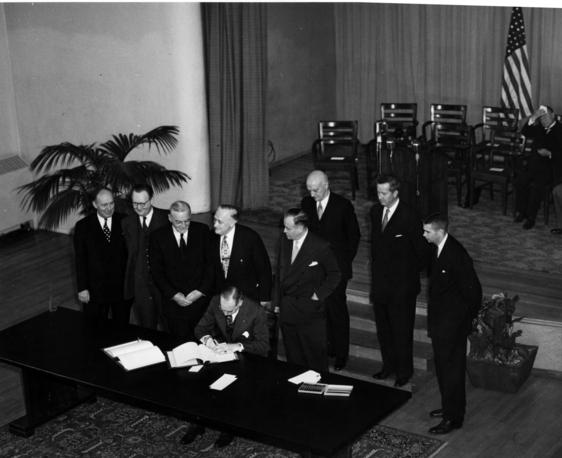Has ANZUS passed its use-by date?
Posted By Geoffrey Barker on June 11, 2015 @ 06:00
For 64 years the ANZUS alliance has been the holy grail of Australian national security policy—the alliance on which Australia relies in the event of an armed attack which it can’t repel alone.
But there are questions as to the alliance’s long-term value as the United States faces seemingly chronic and recurring political, economic and social malaise, and as the economic and military power of China rises in an increasingly multipolar world.
Is ANZUS approaching its use-by date? And would abandoning ANZUS substantially and adversely affect Australia’s long-term strategic circumstances, relevance and reputation?
These are difficult, perhaps even heretical, questions given that Australia has relied for so long on American power. But there’s now a clear case for a radical reappraisal of Australia’s adherence to the treaty.
No Australian government wants to address these issues publicly. Both the government and the electorate want the security benefits of the ANZUS treaty and the economic benefits of the lucrative and growing economic relationship with China. Australia thinks it can have both.
There would be gains and losses if Australia moved to terminate its ANZUS obligations: gains in terms of national autonomy, maturity and international policy flexibility, and losses in terms of regional influence, access to high-end US intelligence, and to some US military technologies. National defence would become significantly more complex and expensive. Australia should plan for and manage these contingencies rather than confront them unprepared.
The 2009 Defence White Paper (DWP) estimates that the strategic primacy of the US declines after 2030—only 15 years in the future. (The 2013 white paper was more circumspect). But even if the US remains the world’s greatest superpower after 2030, its approach to ANZUS could be affected profoundly if its declared military rebalance to the Asia-Pacific region intensifies strategic competition with an increasingly aggressive China.
The US might become unwilling or unable to meet even qualified security guarantees to Australia. China might seek to put pressure on Australia to put its economic relationship with Beijing ahead of its alliance commitments to the US.
Australia might be unable to maintain a Washington–Beijing balance based in the recent words of Defence Department Secretary Dennis Richardson on friendship with both and alliance with one.
It might find itself increasingly alone surrounded by expansionist Asian giants—one of the most abiding fears in the Australian political consciousness. It might also, as the 2009 DWP suggests, find a hard-pressed US ally seeking Australian assistance in handling more regional crises and a belligerent China demanding that it desist.
How then to avoid snubbing the US or kow-towing to China? One way would be to depart the ANZUS alliance now on good terms with the US and without Chinese pressure. Australia could remain a close US partner outside the alliance, able to calculate its national security interests and to act as an independent agent without treaty obligations. In some ways this might enhance regional respect for Australia.
The treaty in fact provides only qualified security guarantees. Article III commits the parties to consult together whenever the territorial integrity, political independence or security of any of the parties is threatened in the Pacific. Article IV, the key action article, says:
Each party recognises that an armed attack in the Pacific area on any of the parties would be dangerous to its own peace and safety and declares that it would act to meet the common danger in accordance with its constitutional processes
A lawyer could drive a truck through these words. Compare them with the action clause (Article 6) of the earlier North Atlantic Treaty (NATO) which declares that ‘an armed attack on one or more of the parties is deemed to an armed attack on the territory of any of the parties…’. An obligation to consult and to act in unspecified ways in accordance with unspecified constitutional processes hardly matches an obligation to regard an attack on one as an attack on all.
The 2009 DWP says ‘Australia would only expect the United States to come to our aid in circumstances where we were under threat from a major power whose military capabilities were simply beyond our capacity to resist’. It acknowledges that the treaty doesn’t commit Australia or the United States to specific types of actions, but ‘it does provide a clear expectation of support’.
But how is Australia’s ‘capacity to resist’ to be judged? And how is the level of ‘support’ to be defined and assessed? The only clue is the assertion that ‘for so long as nuclear weapons exist, we are able to rely on the nuclear forces of the United States to deter nuclear attack on Australia’. That assumption of protection under US extended nuclear deterrence might prove unduly optimistic in the event of a global confrontation between Washington and Beijing.
So what are the limits of the alliance security guarantees and what’s their value in a changing world? Have successive Australian governments since the early 1950s been right to pay the ANZUS treaty insurance premium in Australian blood and treasure in Korea, Vietnam, the Persian Gulf, Iraq and Afghanistan? Under what circumstances can Australia rely on US military assistance if it comes under armed attack given demonstrated US reluctance to assist Australia militarily when asked? In part two, I’ll consider some answers.
Article printed from The Strategist: https://aspistrategist.ru
URL to article: /has-anzus-passed-its-use-by-date/
URLs in this post:
[1] Image: https://aspistrategist.ru/wp-content/uploads/2015/06/96-1186.jpg
Click here to print.
